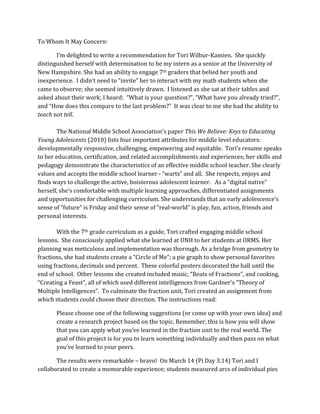McInnes
- 1. To
Whom
It
May
Concern:
I’m
delighted
to
write
a
recommendation
for
Tori
Wilbur‐Kamien.
She
quickly
distinguished
herself
with
determination
to
be
my
intern
as
a
senior
at
the
University
of
New
Hampshire.
She
had
an
ability
to
engage
7th
graders
that
belied
her
youth
and
inexperience.
I
didn’t
need
to
“invite”
her
to
interact
with
my
math
students
when
she
came
to
observe;
she
seemed
intuitively
drawn.
I
listened
as
she
sat
at
their
tables
and
asked
about
their
work;
I
heard:
“What
is
your
question?”,
“What
have
you
already
tried?”,
and
“How
does
this
compare
to
the
last
problem?”
It
was
clear
to
me
she
had
the
ability
to
teach
not
tell.
The
National
Middle
School
Association’s
paper
This
We
Believe:
Keys
to
Educating
Young
Adolescents
(2010)
lists
four
important
attributes
for
middle
level
educators:
developmentally
responsive,
challenging,
empowering
and
equitable.
Tori’s
resume
speaks
to
her
education,
certification,
and
related
accomplishments
and
experiences;
her
skills
and
pedagogy
demonstrate
the
characteristics
of
an
effective
middle
school
teacher.
She
clearly
values
and
accepts
the
middle
school
learner
‐
“warts”
and
all.
She
respects,
enjoys
and
finds
ways
to
challenge
the
active,
boisterous
adolescent
learner.
As
a
“digital
native”
herself,
she’s
comfortable
with
multiple
learning
approaches,
differentiated
assignments
and
opportunities
for
challenging
curriculum.
She
understands
that
an
early
adolescence’s
sense
of
“future”
is
Friday
and
their
sense
of
“real‐world”
is
play,
fun,
action,
friends
and
personal
interests.
With
the
7th
grade
curriculum
as
a
guide,
Tori
crafted
engaging
middle
school
lessons.
She
consciously
applied
what
she
learned
at
UNH
to
her
students
at
ORMS.
Her
planning
was
meticulous
and
implementation
was
thorough.
As
a
bridge
from
geometry
to
fractions,
she
had
students
create
a
“Circle
of
Me”;
a
pie
graph
to
show
personal
favorites
using
fractions,
decimals
and
percent.
These
colorful
posters
decorated
the
hall
until
the
end
of
school.
Other
lessons
she
created
included
music,
“Beats
of
Fractions”,
and
cooking,
“Creating
a
Feast”,
all
of
which
used
different
intelligences
from
Gardner’s
“Theory
of
Multiple
Intelligences”.
To
culminate
the
fraction
unit,
Tori
created
an
assignment
from
which
students
could
choose
their
direction.
The
instructions
read:
Please
choose
one
of
the
following
suggestions
(or
come
up
with
your
own
idea)
and
create
a
research
project
based
on
the
topic.
Remember,
this
is
how
you
will
show
that
you
can
apply
what
you’ve
learned
in
the
fraction
unit
to
the
real
world.
The
goal
of
this
project
is
for
you
to
learn
something
individually
and
then
pass
on
what
you’ve
learned
to
your
peers.
The
results
were
remarkable
–
bravo!
On
March
14
(Pi
Day
3.14)
Tori
and
I
collaborated
to
create
a
memorable
experience;
students
measured
arcs
of
individual
pies
- 2. before
eating
the
pies
and
enjoying
activities
using
the
SmartBoard.
She
routinely
reflected
on
her
teaching,
incorporating
student
evaluations
as
well,
to
inform
her
instruction
and
growth.
Whether
it
was
formative,
summative
or
informal
assessment,
she
worked
hard
to
find
out
what
worked
and
how
to
improve
for
the
future.
Her
entry
into
the
teaching
world
was
seamless;
she
was
a
well‐liked,
valued
member
of
our
interdisciplinary
team.
She
demonstrated
a
strong
work
ethic
and
proved
herself
to
be
dependable,
organized
and
dedicated.
Tori
attended
daily
team
meetings,
participated
in
parent
conferences,
took
on
duties
and
served
as
our
team
technology
mentor
‐
she
cheered
on
kids
at
their
sports
events,
tutored
them
after
school,
talked
with
them
during
advisory.
When
she
recently
visited,
former
students
stopped
in
to
say
“hi”
and
team
members
were
also
happy
to
see
this
respected
young
woman.
Working
together
planning
lessons,
coordinating
activities
using
the
SmartBoard,
or
creating
a
Jeopardy
Game
review
was
very
synergetic;
Tori’s
clear
communication
and
respectful
collaboration
made
our
work
together
invigorating.
She
immersed
herself
in
this
milieu
and
flourished.
Tori
will
continue
to
grow
as
an
outstanding
teacher;
she
made
math
real
and
important.
She
raised
the
bar
and
challenged
them
all
to
“own”
their
understanding
by
making
it
meaningful,
fun
and
reachable.
I
enjoyed
teaching
with
and
learning
from
her;
she
gave
as
much
as
she
received.
Our
time
spent
co‐teaching
together
changed
us
all
–
for
the
better!
Lucky
is
the
school
that
has
her
teaching
their
middle
schoolers.
Sincerely,
Michele
McInnes
Oyster
River
Middle
School
Durham,
NH
03824
February
27,
2010

